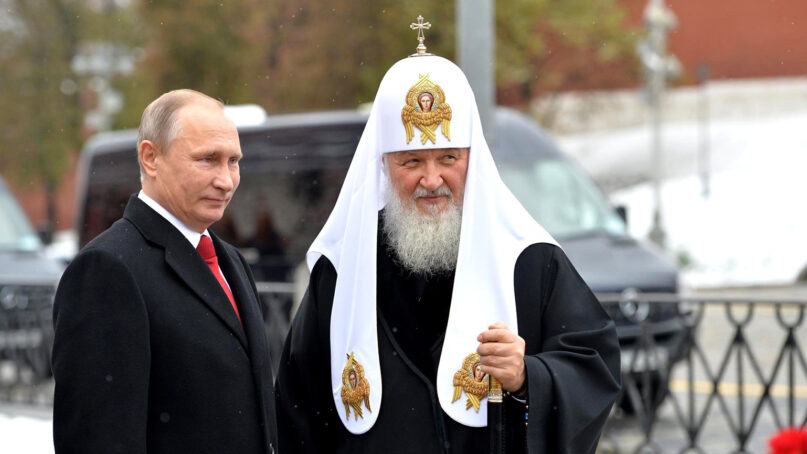A call for Christian leaders to denounce the Russian Orthodox Church
Calling out leaders who seem to consider it bad ecumenical manners to tell the Russian patriarch he’s wrong.

(RNS) — A critical explanation for congressional Republicans’ current resistance to providing aid to Ukraine is the belief among the GOP’s religious right influencers that Russian President Vladimir Putin is a partner in evangelical Christianity’s ongoing support for traditional family values.
Since his invasion of Ukraine, Putin has encouraged that belief by cracking down on abortion access and LGBT rights and even excusing his invasion of Russia’s neighbor as a defense against the encroachment of Western liberal culture.
Above all, Putin has made use of the Russian Orthodox Church and its leader, Patriarch Kirill, much the way Donald Trump made use of evangelical leaders, to establish his traditionalist bona fides. And Kirill, who has made a prominent place for himself in the traditionalist international, has been only too happy to serve as Putin’s stooge and military cheerleader.
Now, on the war’s second anniversary, the members of Fordham University’s distinguished Orthodox Christian Studies Center (in whose work I have been privileged to participate) have issued an open letter calling on leaders of international Christian church bodies to denounce the Russian church’s support for the war. The latter include Ecumenical Patriarch Bartholomew, Pope Francis, Archbishop of Canterbury Justin Welby, the Armenian Primate Karekin II, the heads of the Lutheran and Reformed world organizations, and the general secretary of the World Council of Churches.
“The sins of justification and benediction are not solitary deeds of individual bishops or idiosyncratic priests but institutional transgressions,” the letter declares, going on to say:
It is disheartening that, even two years into the conflict, there is no official Church document condemning the war comprehensively. More disappointingly, there is a lack of consistent and unequivocal denunciation of Russia’s aggression while characterizing the total support for this war from high-ranking church officials in the Russian Orthodox Church as a scandal.
The letter asks the leaders to establish an international task force to hold accountable “those bishops, priests, and laity within the Russian Orthodox Church whose statements, testimonials, sermons, communications, and fabrications have sanctioned and bestowed divine approval upon violence, war, and aggression against the people of Ukraine.”
In a telephone interview, George Demacopoulos, a theology professor who co-directs the Fordham center, was particularly critical of Kirill for promising a remission of sins for Russian soldiers who died in the line of duty in Ukraine.
“This is unbridled authoritarian aggression that is being authorized from the pulpit,” he said. “There has never been a case where a national [Orthodox] church has so unambiguously authorized the use of violence against another group of Christians, let alone another group of Orthodox Christians.”
Although Bartholomew has criticized the Russian Orthodox Church for being complicit in the war, Demacopoulos would like to see him summon his synod to issue a denunciation. “I’d also like to see something from the Vatican and Canterbury with more teeth, something that actually acknowledges that the Russian church has lost its way, that the Moscow patriarchate has failed in its responsibility and the Ukrainians are in the right,” he said. “Something from the World Council of Churches would be nice too. They’ve totally skirted it.”
While church leaders are often enough critical of the actions of governments, they tend to shy away from calling out the spiritual enablers. It’s as if they think it’s bad ecumenical manners to tell other Christian leaders they’re in the wrong.



No comments:
Post a Comment